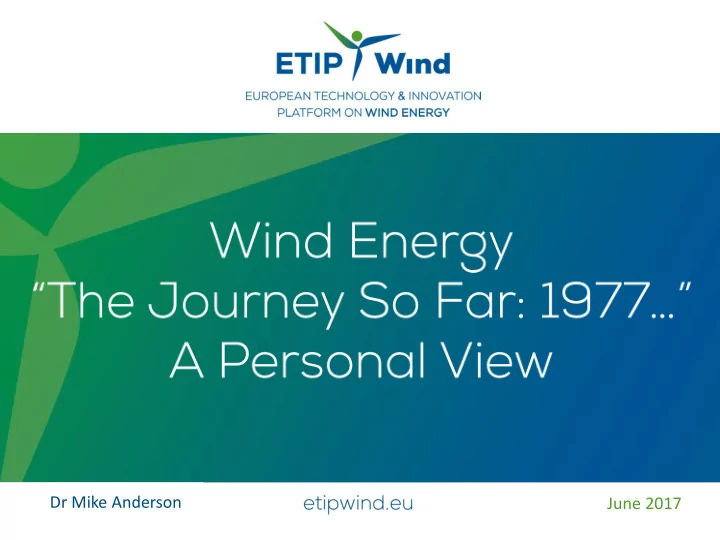

Dr Mike Anderson June 2017
The Future of Wind Energy “The race for renewable energy has passed a turning point. The world is now adding more capacity for renewable power each year than coal, natural gas, and oil combined. And there's no going back.” Bloomberg New Energy Finance April 2015
EU Energy Policy The Energy Union forms the basis of all EU energy policy. Its goal is to get to: • "Secure, sustainable, competitive, affordable energy for every European“. • Ambitiously attempts to join up climate, energy and competitiveness policies for a transition to a more secure, affordable and decarbonised energy system to meet the 2030 and the Paris objectives whilst boosting the economy.
EU Energy Policy The 5 guiding dimensions of the Energy Union are: • Energy security (covering gas security of supply, regionality, diversity e.g. through renewables). • A fully-integrated internal energy market. • Energy efficiency. • Transition to a low carbon society (e.g. climate targets). • Research, innovation and competitiveness.
Current Status - Capacity Total EU installed wind energy capacity is now 153.7GW. Wind provides 10.4% of Europe's electricity. Nearly 86% of new power added in the EU in 2016 was from renewables. Wind accounted >50% of new generation for the first time. Renewable energy generation (at above 16%) is on track with its indicative trajectory in the Renewable Energy Directive for 2020
Current Status - Investment European-wide investment in renewables in 2016 hit a record EUR 27.5billion. 5% more than in 2015. Largely due to offshore investments, as onshore investments dropped to EUR 93bn (first decrease in past 5 years).
Current Status - Jobs There were job losses in the solar PV and wind sectors over the last 5 years due to competition from China. Globally, wind employs 1.2 million people, making it one of the fastest growing industrial segments in the world (GWEC, WindEurope June 2017) In EU, there are 300,000 jobs in wind energy.
Climate Change – The Current Driver
Renewables – Post 1940
NASA 1975 to 1996
My Early Years – Cambridge University (1977 – 1981)
Research and Development – 1977 to 1980
First Composite Wooden Blade made in the UK - 1979 • Jim Platts of Gifford Technology. • Made 3m and 6m diameter wood epoxy blades
UK Department of Energy View of the Future – 1975 The UK Department of Energy had a vision of large offshore wind farms in the early 1980’s. To support this vision they invested in two competing technologies, horizontal and vertical axis wind turbines: • Taylor Woodrow was asked to form a consortium to develop large scale horizontal axis wind turbines. • Sir Robert McAlpine and Sons Ltd were asked to form a consortium to develop large scale vertical axis wind turbines of the Musgrove type.
LS1 and MS3 – Wind Energy Group - 1987 • 3 MW, 60m dia Orkney Scotland • Teetered hub. • Obsolete before it was completed. • 1992 large cracks in blade. • Shutdown 1997 and demolished 2000. • White elephant.
16 Vertical Axis Wind Turbines – 1980 to 1990
17 Vertical Axis Wind Turbines – 1980 to 1990 VAWT 850 - 1990 • 500 kW • 38m diameter • Variable speed • Glass fibre epoxy blades.
RES 1 MW – 1996 to 2011 • 52m diameter • Many industry leading features including:- Pitch control using independent actuators Full variable speed Water cooled generator and inverters • Funded by Thermie and UK
19 Blade Materials and Manufacturing (1970 to 2016)
20 Blade Materials and Manufacturing (1970 to 2016)
21 Blade Materials and Manufacturing (1970 to 2016) • The wind industry has been increasing blade length by Largest wind turbine Offshore not Onshore approximately 2 metres per year over the last 10 years. blade 88.4 metres. • More turbines are variable speed and therefore the tip speed has also increased. • Blade are becoming more slender therefore more prone to increased flap wise deflections (tower impact) and torsional instability. • Steel 1970, Wood epoxy 1980 to 2004. • Majority of blades now made from a pure glass fibre and a polyester matrix.
An Evolution of Turbine Design (1975 to 2015) Design Revolution Stagnates Manufacturing Evolves
Revolution or Evolution Evolution Getting the plane into the air was the problem. Revolution Technology is a Darwinian process unless there is disruptive change. In the same way dinosaurs died through a dramatic event it will need a large external influence to change wind turbine technology from a 3 blades upwind rotor. An iPhone moment!
Revolution (or Evolution)
Revolution (or Evolution)
EU Funded Research Pros: • Gathers many different groups, from many countries and institutions. • Funding makes bigger projects possible, which would otherwise have been very difficult to organise and fund. Cons: • Big slow projects, results are often many years away. • The requirement of multiple countries, often leads to non- optimal teams.
EU Funded – Wind Energy - Success
WEGA II Large Wind Turbines • Turbines were ~ 500kW • Support was needed to push through 1MW barrier • 1991 the Commission addressed this with a call. • Major European manufacturers proposed 10 turbines. • The Commission supported 5 projects. • Bonus 750/1000kW • Enercon E-66 • Nordic 1000 • Vestas V63 • Nortank NTK1500
WEGA II Large Wind Turbines
EU Funded – Wind Energy - Unsuccessful
EU Funded – Wind Energy – “Recipe for Success?” • Clear well defined objectives. • Funding schemes that support few-player arrangements, not requiring the establishment of conglomerates or other forced inclusion of non-value adding partners. • Simplification of bureaucratic requirements. • Led by industry not academia and/or consultants. • Solid solutions to IP issues. • Allocation of some funds to the industrial partners. • Don’t do R&D for the sake of it or to preserve jobs.
THANK YOU
Recommend
More recommend